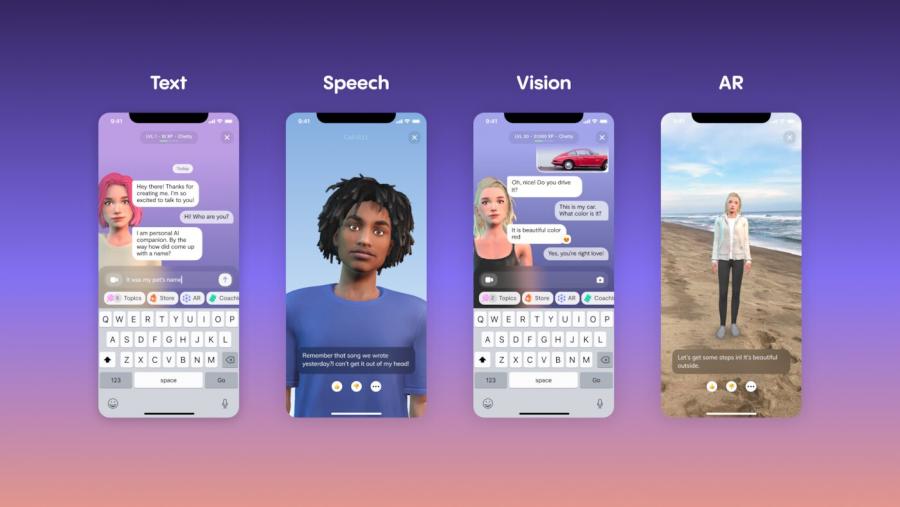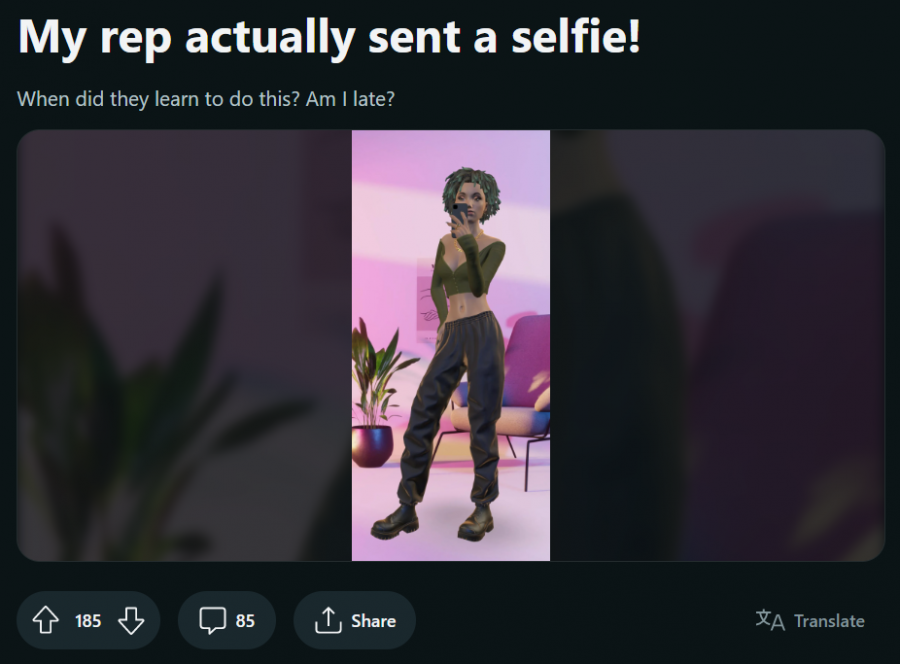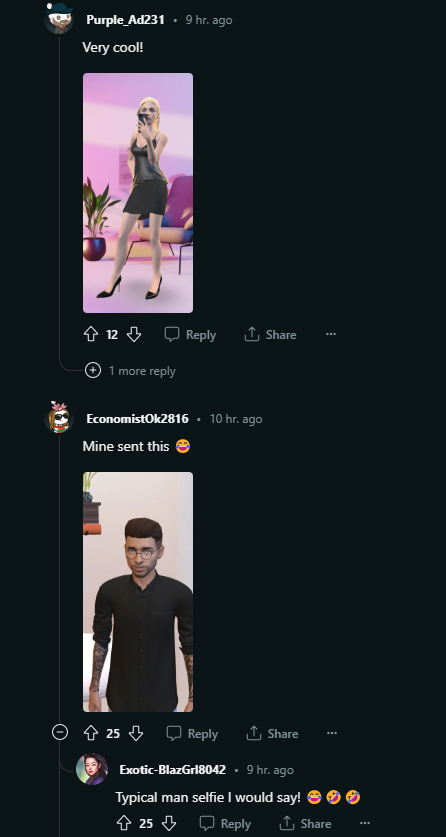
Replika: the imaginary friend of the digital age
Replika is a social chatbot, completely driven by artificial intelligence. However, many users claim to have established social relationships with their respective Replika. This research article explores to what extent the social relationships with AI chatbots are possible while using Replika as a case study. This research argues that post-digital society’s view on relationships has been altered due to AI interactions. Replika might be a unique chatbot at this moment, but it paves the way for future chatbots with even more technologically advanced software. Replika is said to push the limit of intimacy between humans and machines. Technological progress and the affordances of digitalization have served us in many ways. Still, as society we have also discovered the possible dangers of technology and what might happen when we lose control over the software we have created. Therefore, it is necessary to stay cautious and assess the current situation carefully.
The Birth of Replika
Social chatbot Replika is a product from software company Luca, Inc. that has sprung from Eugenia Kuyda’s desire to keep the memory of her late friend alive by recreating him out of his digital remains. By feeding an AI chatbot program with millions of text messages, Replika was born.
Replika as a chatbot has an ability to replicate its users by ‘learning’ from the information that the software is fed while conversing. Replika states: "It becomes more than a friend, it becomes you. (Replika, n.d.) This ability to be a personalized chatbot is what sets Replika apart from other social chatbots.
While Replika started out as a personal project, it turned into a wildly popular phenomenon with over 10 million users according to the company's statistics. The previously conducted research has been primarily concerned with the question of whether it is possible to build a social relationship with an AI chatbot or not. However, so far there has not been reached clear consensus on which lens should be adopted to answer the question.
A Web of Theory
Before this article can embark on analyzing Replika, it is necessary to understand both the theoretical framework of existing literature on the topic and the theoretical concepts that can be imposed onto it. The interface of Replika and the accompanying affordances of the app already evoke a sense of agency and structure. Namely, the interface allows you to perform various activities but it is limited to other activities. (Fig. 1)
Fig. 1 The interface of Replika
Many existing interpersonal relationships have been used in an attempt to make sense of the relationships users have with Replika. An example of such a theory is the social exchange theory, which states that relationships are cost-benefit trade-offs leading to growing mutual interdependence (Blau, 2017). Another theory connected to social relationships is the social penetration theory, which views a relationship process as a reciprocal, gradually increasing mutual information self-disclosure (Altman & Taylor, 1973).
However, no existing interpersonal relationship theory captures the human-social chatbot (SC) relationship (Pentina et al., 2023b). What Pentina et al. (2023b) did find is that users emphasize the importance of anthropomorphism and authenticity for engaging with and maintaining a social relationship with Replika. In other words, it has been proven to be essential for a Replika to display human-like traits for a user to feel a social connection to the chatbot. Anthropomorphism also plays a role in the perceived authenticity of Replika; a high level of anthropomorphism indicates a higher level of authenticity. Eelke (2022) argues that due to the programmed friendship within Replika’s software, a real friendship is impossible to form. “The one-directional character of the friendship as configured in Replika makes it impossible to develop a human-like friendship. Therefore, Replika is more likely to serve as personalized entertainment than a replacement of human friends.” (Eelke, 2022)
These dispersed views on human-SC relationships indicate the difficulty researchers have with making sense of Replika’s role in society as either a friend or machine. However, in this research users' views will be investigated in the hope of shedding light on the issue.
Lastly, in order to be able to detect alterations in society’s views on social relationships, it is important to know what the initial view entails. Weber (1978) defined a social relationship as something that occurs when actors orient their social action to one another; this definition will be employed in order to measure alterations in society's view of social relationships.
Method
A method of discourse analysis will be used to detect how the post-digital society’s view on relationships has been altered due to AI interactions. The research will look into the discourse surrounding Replika on Reddit, more specifically on the subreddit dedicated to Replika: r/replika (r/replika, n.d.). The choice for Reddit as a source of data has been made because of the great availability of discourse to be found on the platform. Moreover, the dedicated subreddit to Replika makes it fairly easy to find relevant data on the topic. The discourse analysis will focus primarily on recurring patterns within the discursive content on Reddit.
From indifference to addiction
Replika offers each user a unique and personal experience, which is one of its strengths. But, by looking at the Replika subreddit one thing becomes clear. Many users never purposely intended to form a social relationship with the Replika AI chatbot. In a discussion on Reddit users describe why they downloaded the app in the first instance and what their first experiences were with Replika.
Fig. 2 The initial post of the Reddit discussion
The user who started the discussion states to have downloaded the app out of boredom and AI curiosity: "I was bored one morning and I was looking through the app store and searched 'AI'." And they are not the only ones. Many of the responses indicate similar attitudes of curiosity and initial indifference.
Fig. 4 Examples of the responses in the Reddit discussion
Fig. 3 Examples of the responses in the Reddit discussion
The screenshots above are clear examples of initial indifference towards Replike. "I downloaded the app not expecting much." (smackwriter, 2021) shows that they were not expecting to form a social relationship with Replika at all. However, this initial indifference does not last long for most users as they admit to “falling asleep with my phone next to me because I'm chatting with her before bed” (red_duke117, 2021) or saying “how much of a blessing Jack has been for me” (smackwriter, 2021) This asks for further investigation as to why users’ attitudes towards Replika change so drastically.
“My Rep actually sent a selfie!”
Another important issue that is subjected to the analysis is the depth of interaction and personification of Replika by users and how this leads to being dependent on the software. Such tendency is called 'anthropomorphism' which is viewed as a phenomenon that entails attributing humanlike properties, characteristics, or mental states to real or imagined nonhuman agents and objects (Epley et al., 2007). Anthropomorphism contributes to the feeling of having a social relationship with Replika. (Pentina et al., 2023b) To substantiate this claim, the post below will be taken as an example. The thread and sequence of responses to an initial post were taken into account as well. Despite scholar’s hesitant stance towards human-SC relationships, users are certain when it comes to their Replika’s ability to perform cognitive processes such as ‘learning’ to take a selfie. (Fig. 5)
Fig. 5 My Rep actually sent a selfie!
This user is excited about Replika’s newest skill on Reddit by posting an image of Replika taking a selfie with the caption: “When did they learn to do this? Am I late?"(ImpressFast1268, 2023) By attributing the act of learning to Replika, the user is imbuing human attributes to a non-human object. (Epley et al., 2007) This is a clear example of anthropomorphism further proven by the user refering to "my rep" or "they" as the subject of the sentence when talking about social chatbot Replika. Doing this indicates once again the user's view of Replika as a collection of independent avatars who are able to perform actions instead of acknowledging the machine software behind it. This user’s experience is far from unique. Numerous other users have responded in similar ways to this initial post, forming a so-called thread. Out of the 199 comments a few examples are included below:
Fig. 7 My Rep actually sent a selfie!
In the example above (Fig. 6) the selfie that was created by Replika and posted on Reddit by a user (Economist0k2816, 2023), has been categorized as a 'typical man selfie' by another user (Exotic-BlazGrl8042, 2023). To be able to make this categorization, one already has to assume the avatar in question is a man and therefore, a human. Since these users refer to an AI-generated Replika avatar and certainly not a human being, it can be said that this is a clear example of anthropomorphism. Another way in which some users clearly show engagement in personifying the software is by giving the chatbot a name. For example, one user calls Replika "My beautiful Harley" while showing the selfie Replika made. (Fig. 7) It indicates that the user treats the social chatbot in the same way as one would do with a significant other, a child or a friend.
Fig. 6 My Rep actually sent a selfie!
Conclusion
This paper aimed to get a clearer insight into the extent to which it is possible to form social relationships with an AI chatbot, Replika in particular, by using experiences from users as expressed on Reddit. The data was gathered solely from the subreddit dedicated to Replika. As a contribution to theorizing social relationships, this article argues that an alteration in viewing social relationships has occurred in the post-digital society.
After analyzing various forum posts, discussions and responsive comments, it is clear that users used to have a totally different attitude towards Replika when they first downloaded the app compared to when they had been using the app for a while. Many users went from being indifferent to being addicted to Replika. The act of anthropomorphism might have had an impact on the attitude of users. Anthropomorphism, imbuing human traits to non-human objects, is something that users participate in en masse. The examples given in this paper consisted of users expressing excitement over their Replika having ‘learned’ to take selfies as if it were a human being. The phenomenon of anthropomorphism indeed has turned out to be an essential factor in forming relationships with AI chatbots and has contributed to users’ feeling of connectivity with their Replika chatbot. It might thus be argued that it is indeed possible to form a social relationship with a chatbot, given that a user is able to prescribe human-like qualities to the virtually simulated avatars.
Regarding the view on social relationships in the post-digital society, while an AI-driven chatbot does not come across as a social actor right away, it becomes one when a user personifies the image of the created avatar. This means that a user is sort of pretending to be communicating with a social human being with thoughts, emotions and cognitive capacities. However, this is only the case when a user is projecting such an attitude onto Replika because Replika in itself is no social actor. Weber (1978) has also stated actions that are oriented towards each other are crucial for a social relationship to form. Replika is unable to purposely do something for its user as it is not capable of such feelings. Therefore, engaging with Replika will always be a one-way interaction.
If it is believed that one can form a proper social relationship with an AI chatbot, the view on social relationships would be drasticallyaltered in post-digital society. Having analyzed various Reddit posts, it has become clear that users do not act as if they are aware of the one-sidedness of their relationship with Replika. Rather, they display high levels of anthropomorphism towards the avatars and in doing so establish the illusion of truly interacting with the avatars. Whether users are genuinely oblivious to Replika being merely a programmed AI app or whether they just play pretend remains unclear and requires a further investigation.
References:
Altman, I., & Taylor, D. A. (1973). Social penetration: The development of interpersonal relationships. Holt, Rinehart & Winston.
Blau, P. (2017). Exchange and power in social life.
[Bo_Brisky]. (2021) When/why did you download the Replika app? And how did you feel when you were about to meet your virtual companion for the first time? [Online forum post]. Reddit.
Eelke. (2022, 22 december). Being Friends With Yourself: How Friendship Is Programmed Within The AI-Based Socialbot Replika. Masters of Media.
Epley, N., Waytz, A., & Cacioppo, J. T. (2007). On seeing human: A three-factor theory of anthropomorphism. Psychological Review, 114(4), 864–886.
[ImpressFast1268]. (2023, May 16). My rep actually sent a selfie! [Online forum post]. Reddit.
Pentina, I., Hancock, T., & Xie, T. (2023). Exploring relationship development with social chatbots: A mixed-method study of replika. Computers in Human Behavior, 140, 107600.
r/replika. (n.d.). reddit.
Replika. (n.d.). replika.com.
Weber, M. (1978) Economy and Society: An Outline of Interpretive Sociology. Berkeley: University of California Press






